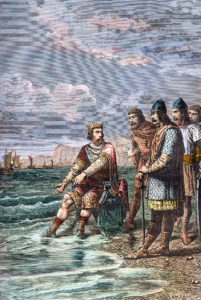
We are not going to resolve the identity and institutional questions with which we are currently wrestling without acknowledging the Nordic streak in the British character.
In principle, this should not be difficult. The North Sea — gloriously inviting on a warm summer’s day and tumultuous in the depths of winter — is, like, a mini-Mediterranean, one of the great crucibles of civilisation.
Hybridity is an essential concept in understanding national identity, especially in Britain, a country made up of two nations, a principality and a province, all woven into a whole by a shared constitution, experience, geography, culture, custom and practice but being pulled hither and thither by Brexit.
The Atlantic-facing side of the British character has been well-aired and so has the Continental, across the Channel. But for some reason the North Sea and our relationship with our fluent-English speaking neighbours, with strong maritime traditions, a liking for diary products, golf and constitutional monarchy in Sweden, Norway, Denmark and the Netherlands have been neglected.
Freddie Sayers writes in these pages about the quirks of Swedish culture, but allow me to offer three examples of what we share with our Nordic neighbours.
The first is to be found in the burial site of Sutton Hoo, in Suffolk. The mighty helmet, shield and other items exhumed in the excavations strongly resemble those in ship-burials in Vendel, Sweden. We cannot be sure of the precise reason, but it is clear that the Sutton Hoo site is expressive of peoples who were bustling back and forth across the North Sea, trading as far as Byzantium.
Their Viking successors might be best-remembered as raiders, but things settled down in the tenth century. The East of England became, temporarily, Danelaw and in the eleventh century England was briefly swept into the arc of Denmark and we had two Danish Kings, Sven Forkbeard and Cnut.
The conflicts were never capable of stopping the trade. If you visit Kings Lynn in Norfolk you will find among architectural remnants of a Medieval trading hub the Hanse House, originally a series of residences and warehouses leased to merchants from the Hanseatic League. This was an alliance of trading cities and trading posts stretching from Aberdeen to Novogord in Russia. Along these routes travelled not just goods but ideas, including the Reformation.
The third example, I would say, is manners. The Nordic nations are characterised by a strong middle class, high levels of social capital and of an understanding of “liberty under the law”. But they do not just rely on the law to enforce social norms, they respect custom, practice and consideration for one another. These are the bourgeois values which also underpinned the Industrial Revolution here, as the historian Deidre McCloskey (correct) has explained.
How we should celebrate and nurture our cultural and economic links is across the North Sea through all sorts of things from student-exchanges, to sport, to perhaps joining the European Free Trade Association (a sort-of free trade talking shop founded by Britain in the 1960s) is a separate conversation.
One thing I do assert is the Nordic countries, particularly Sweden and Norway, have done a fantastic job in confronting the coronavirus, avoiding the worst excesses of the lockdown and limiting the economic damage. Their states, built on strong institutions, high levels of female participation and sovereign wealth funds, are apparently well prepared for the challenges of the 21st Century. I suspect the Scots look upon them with admiration and so should the rest of us.










Join the discussion
Join like minded readers that support our journalism by becoming a paid subscriber
To join the discussion in the comments, become a paid subscriber.
Join like minded readers that support our journalism, read unlimited articles and enjoy other subscriber-only benefits.
Subscribe